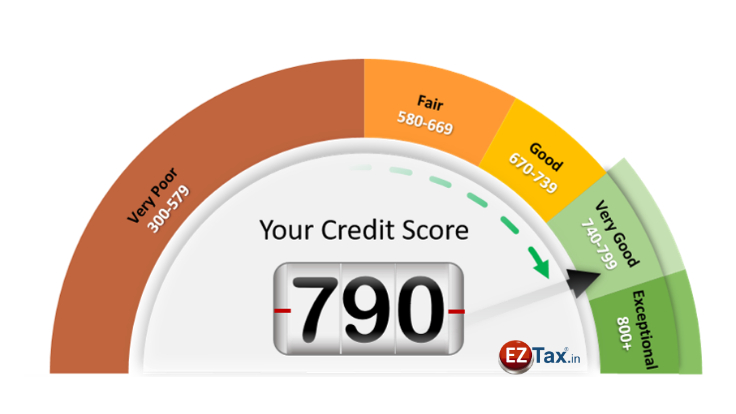 4.8 ★★★★★ Excellence since 2016
4.8 ★★★★★ Excellence since 2016 Home > EZTax.in Money > Credit Cards
Credit Score is a 3-digit number represents the creditworthiness of an individual. Higher credit score yields better loans, faster credit card approvals at a much lower interest rates. A journey towards a higher credit score is mainly depends on credit behaviour and discipline. Learn more for a higher, better, sustainable credit score.

When you apply for a loan from a bank, one of the things they will check is your credit score. A credit score is an indication of your creditworthiness. Based on your credit score a bank will decide whether to give you a loan or not. A higher credit score also means you are eligible for a higher loan amount and lower interest rates.
Credit scores range from 300-900. It is prepared by one of the four credit bureaus - TransUnion CIBIL, Experian, Equifax or CRIF High Mark. The closer your credit score is to 900, the better it is. 750 is considered a good enough credit score. However, anything less than 700 and the bank may reject your loan. However, if you have a low credit score, you can work to improve it. But it will not happen immediately. Here are some things you can do move towards a higher credit score.
If you have any loan running, make it a point to pay your EMIs on time. The best method is to set up an auto debit instruction for your EMI payments. Also, keep a few months of expenses as an emergency fund, so that even in case of a job loss or some other emergency, you do not miss out on EMI payments. Not paying your EMIs on time will further hamper your credit score. Paying your EMIs timely will improve your credit score with time.
Credit cards give you an option where you can pay a minimum amount due every month to escape late payment fees. However, when you exercise the option, you will be charged an interest rate which could be 36-42 per cent annually. This would not only push you towards a debt trap, but also lower your credit score.
The idea is to spend only that much on your credit card that you can pay in full at the end of your billing cycle. If you pay your credit card bills in full over a period of time, your credit score will improve gradually.
If you have a credit card limit of Rs 1 lakh and you use up to that amount every month and even pay your bills on time, the bank will perceive that you are in higher need of credit and this will lead to a lowering of your credit score. As a thumb rule, you should not spend more than 30-40 per cent of your credit limit. This is also known as the credit utilization ratio. If you keep your spending within this limit and pay your bills on time, your credit score will improve over time.
Credit Score plays an important role in getting a good credit card. What influence your Credit Score?
If you have too much debt, it adversely affects your credit score as it indicates that you are credit hungry. Your EMI outgo should not be more than 30-40 per cent your total income. Take a new loan, only when you have repaid an existing one. Also, avoid high interest rate loans like personal loans.
Your credit score may suffer due to an errors or discrepancies. So, it is important to check it on a regular basis. If you notice any error, you should raise it with the credit bureau and get it rectified. This will improve your credit score in case it had gone down due to the error.
Periodically checking your own credit score will not hurt your Credit Score.
When you check your own credit score by requesting a credit report, it creates a soft inquiry. Soft inquiry will not participate in credit score calculations. Generally checking once or twice a year is generally recommended to see any errors in the report.
Avoid making too many loan applications in a short period. If you are doing that and are rejected, your credit score will go down. Instead, wait for a while and apply again when your credit score has improved.
Keeping the above in mind and inculcating some financial discipline will ensure that you your credit score improves over time. If you are experiencing low credit score, you may opt for secured credit card and build your credit history.
Credit Score could be used in any one or a combination of the following situations
Disclaimer: This article provides an overview and general guidance, not exhaustive for brevity. Please refer Income Tax Act, GST Act, Companies Act and other tax compliance acts, Rules, and Notifications for details.